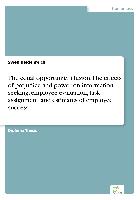- Start
- The equal opportunity illusion: The effects of prejudice and power on information seeking, employee evaluation, task assignment, and estimates of employee success
The equal opportunity illusion: The effects of prejudice and power on information seeking, employee evaluation, task assignment, and estimates of employee success
Angebote / Angebote:
Inhaltsangabe:Abstract:
This study tested the effects of individual variables (prejudice level) and situational factors (power instructions) on information seeking strategies, employee evaluation, estimation of likely success, and task assignment in an employer ¿ employee, ethnicity relevant experimental design, with subjects always assigned the role of employer and an ostensibly other person (a same gender black individual depicted in a photograph) assigned the role of employee. Subjects (N=60) were categorized into groups that varied on power (exclusive or inclusive leadership instruction) and prejudice (quartile split of MRS scores). Participants were asked to select a subset of questions and tasks from various lists for the ostensibly other subject to answer. Participants at a later point in the experiment rated selected questions and tasks. At the end of the experiment the participants were asked to give a final employee evaluation and estimation of likely success for a future project.
Next to the attempt of replicating generally accepted and expected interrelations of power and prejudice with certain attention (information ¿ seeking) strategies and the use of stereotypes and their effect on evaluation and estimation, one of the main focuses of this study is on the effects of the above variables on behavior (final task assignment).
Consistent with predictions participants with a low prejudice level assigned more valued tasks, focused more on strength of the employee and estimated greater employee success than did high prejudice participants. Also participants with inclusive leadership instructions assigned relatively more skill tests with supporting help and estimated greater
employee success than participants with exclusive leadership instructions. Interaction -
effects across the skills test- information seeking-, employee evaluation-, final task assignment-, and estimated success- variables showed that high prejudiced participants in the exclusive leadership style condition respond in stereotype consistent ways significantly more often than participants in the inclusive leadership condition and low prejudice participants.
Zusammenfassung:
Diese Studie untersuchte den Einfluss individueller (Vorurteilslevel) und situationaler Faktoren (induzierter Machtstatus) auf Strategien der Informationssuche, der Bewertung eines Bewerbers in einer Bewerbungssituation, der Einschätzung von Erfolgschancen, sowie der Aufgabenverteilung. Das [...]
Folgt in ca. 10 Arbeitstagen
